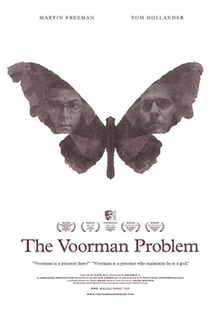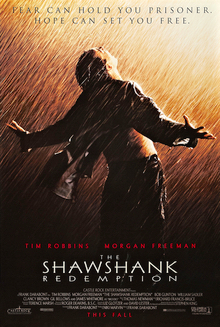
The Shawshank Redemption is a 1994 American prison drama film written and directed by Frank Darabont, based on the 1982 Stephen King novella Rita Hayworth and Shawshank Redemption. The film tells the story of banker Andy Dufresne, who is sentenced to life in Shawshank State Penitentiary for the murders of his wife and her lover, despite his claims of innocence. Over the following two decades, he befriends a fellow prisoner, contraband smuggler Ellis "Red" Redding, and becomes instrumental in a money laundering operation led by the prison warden Samuel Norton. William Sadler, Clancy Brown, Gil Bellows, and James Whitmore appear in supporting roles.
Rita Hayworth and Shawshank Redemption is a realist novella by Stephen King. It was first published in 1982 by Viking Press in his collection Different Seasons. It was later included in the 2009 collection Stephen King Goes to the Movies. The plot follows former bank vice president Andy Dufresne, who is wrongly convicted of murdering his wife and her lover and ends up in Shawshank State Penitentiary, where corruption and violence are rampant.

The L-Shaped Room is a 1962 British drama romance film directed by Bryan Forbes, based on the 1960 novel of the same name by Lynne Reid Banks. It tells the story of Jane Fosset, a young French woman, unmarried and pregnant, who moves into a cheap London boarding house, befriending a young man, Toby, in the building. The work is considered part of the kitchen sink realism school of British drama. The film reflected a trend in British films of greater frankness about sex and displays a sympathetic treatment of outsiders "unmarried mothers, lesbian or black" as well as a "largely natural and non-judgmental handling of their problems". As director, Forbes represents "a more romantic, wistful type of realism" than that of Tony Richardson or Lindsay Anderson.

Derek William Bentley was a British man who was hanged for the murder of a policeman during a burglary. Christopher Craig, then aged 16, a friend and accomplice of Bentley, was accused of the murder. Bentley was convicted as a party to the crime under the English law principle of joint enterprise, as the burglary had been committed in mutual understanding and bringing deadly weapons. The outcome of the trial, and Home Secretary David Maxwell Fyfe's failure to grant clemency to Bentley, were highly controversial.

David Russell Strathairn is an American actor. Known for his leading roles on stage and screen, he has often portrayed historical figures such as Edward R. Murrow, J. Robert Oppenheimer, William H. Seward, and John Dos Passos. He has received various accolades including an Independent Spirit Award, a Primetime Emmy Award, and a Volpi Cup, and has been nominated for an Academy Award, a BAFTA Award, two Golden Globe Awards, and four Screen Actors Guild Awards.

The Seven Year Itch is a 1955 American romantic comedy film directed by Billy Wilder, who co-wrote the screenplay with George Axelrod. Based on Axelrod's 1952 play of the same name, the film stars Marilyn Monroe and Tom Ewell, with the latter reprising his stage role. It contains one of the most iconic pop culture images of the 20th century, in the form of Monroe standing on a subway grate as her white dress is blown upwards by a passing train. The titular phrase, which refers to waning interest in a monogamous relationship after seven years of marriage, has been used by psychologists.

The Jacket is a 2005 American science-fiction psychological thriller film directed by John Maybury and starring Adrien Brody, Keira Knightley, Kris Kristofferson and Jennifer Jason Leigh. It is partly based on the 1915 Jack London novel The Star Rover, published in the United Kingdom as The Jacket. Massy Tadjedin wrote the screenplay based on a story by Tom Bleecker and Marc Rocco. The original music score is composed by Brian Eno and the cinematography is by Peter Deming.

The Young Poisoner's Handbook is a 1995 black comedy-drama film based on the life of Graham Young, more commonly known as "The Teacup Murderer". It was directed by Benjamin Ross and written by Ross and Jeff Rawle. The film stars Hugh O'Conor in the lead role.
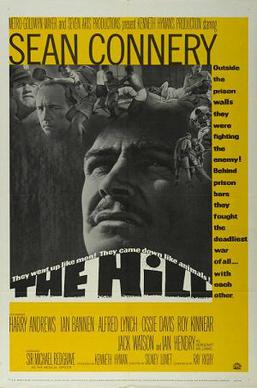
The Hill is a 1965 British prison drama war film directed by Sidney Lumet, set in an army prison in North Africa during the Second World War. It stars Sean Connery, Harry Andrews, Ian Bannen, Ossie Davis, Ian Hendry, Alfred Lynch, Roy Kinnear and Michael Redgrave. The screenplay was by Ray Rigby based on the 1965 play of the same title by Rigby and R.S Allen.

Kenneth Griffith was a Welsh actor and documentary filmmaker. His outspoken views made him a controversial figure, especially when presenting documentaries which have been called "among the most brilliant, and controversial, ever made in Britain".

Mrs McGinty's Dead is a work of detective fiction by British writer Agatha Christie, first published in the US by Dodd, Mead and Company in February 1952 and in the UK by the Collins Crime Club on 3 March the same year. The US edition retailed at $2.50 and the UK edition at nine shillings and sixpence (9/6). The Detective Book Club issued an edition, also in 1952, as Blood Will Tell.

Diary of a Country Priest is a 1951 French drama film written and directed by Robert Bresson. The film stars Claude Laydu in his feature film debut. A faithful adaptation of Georges Bernanos' Grand Prix du Roman-winning novel of the same name, the film tells the story of a sickly young Catholic priest who has been assigned a small village in northern France as his first parish. The film illustrates the eroding religious faith in the French countryside and the clergy's struggles to reach younger believers disillusioned by the inflexibility, and sometimes hypocritical flexibility, of the Church at the time.

Elizabeth I is a two-part 2005 British-American historical drama television serial directed by Tom Hooper, written by Nigel Williams, and starring Helen Mirren as Elizabeth I of England. The drama covers approximately the last 24 years of her nearly 45-year reign. Part 1 focuses on the final years of her relationship with the Earl of Leicester, played by Jeremy Irons. Part 2 focuses on her subsequent relationship with the Earl of Essex, played by Hugh Dancy.

Crazy as Hell is a 2002 psychological film that is based on the 1982 novel Satan: His Psychotherapy and Cure by the Unfortunate Dr. Kassler, J.S.P.S. by Jeremy Leven and follows Dr. Ty Adams, an aggressive and overconfident psychiatrist producing a documentary film about a nearby state-run mental hospital. While treating a new patient who claims to be Satan, Dr. Adams begins to question his own perceptions.

6,000 Enemies is a 1939 American drama film directed by George B. Seitz and starring Walter Pidgeon as a successful District Attorney who is framed on charge of bribery. Although innocent, he is sent to prison where he fights to clear his name. The film also stars Rita Johnson.
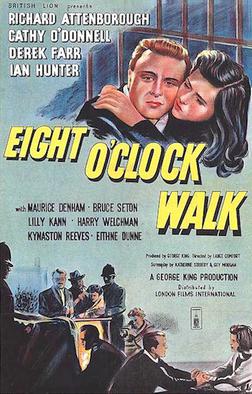
Eight O'Clock Walk is a 1954 British drama film directed by Lance Comfort and starring Richard Attenborough, Cathy O'Donnell, Derek Farr and Maurice Denham.

Mix Me a Person is a 1962 British crime drama film directed by Leslie Norman, starring Anne Baxter, Donald Sinden, Adam Faith, Walter Brown and Carole Ann Ford. A young London criminal is faced with being hanged for murdering a policeman. With even his defence counsel convinced of his guilt, a female psychiatrist tries to prove that the police and legal system have made a mistake.
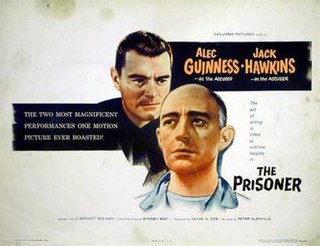
The Prisoner is a 1955 British black and white psychological thriller film directed by Peter Glenville and based on the play of the same name by Bridget Boland. It stars Alec Guinness and Jack Hawkins. Although controversial at the time of its release, the film received five nominations at the 9th British Academy Film Awards: Best Film From Any Source, Best British Film, Best British Screenplay, and Best British Actor.

Women's Prison is a 1955 American film noir crime film directed by Lewis Seiler and starring Ida Lupino, Jan Sterling, Cleo Moore, Audrey Totter, Phyllis Thaxter and Howard Duff.
Baldwin Li is an English film producer from Manchester, United Kingdom.
